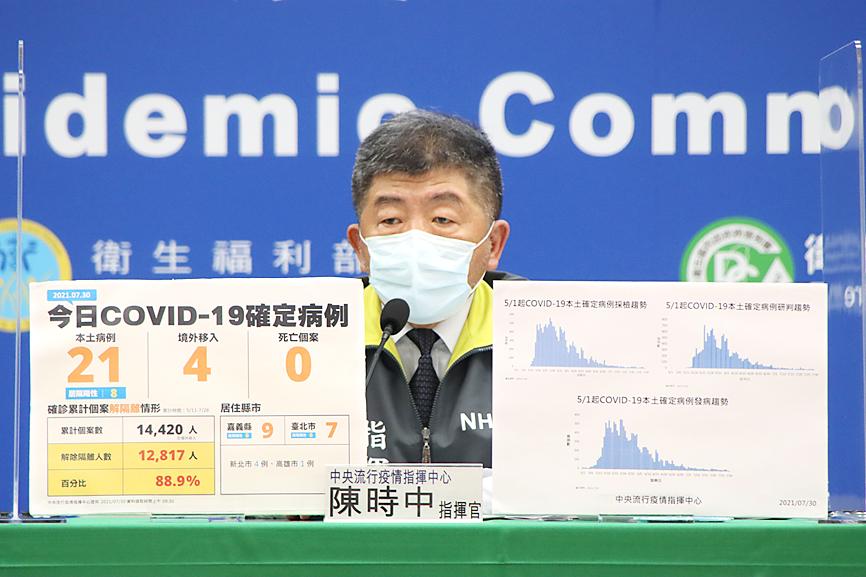A business in Chiayi County has reported 11 cases of COVID-19, with their source of infection possibly from northern Taiwan, the Central Epidemic Command Center (CECC) said yesterday.
At its daily news briefing, the center reported 21 new local cases — nine in Chiayi, seven in Taipei, four in New Taipei City and one in Kaohsiung, with no new fatalities.
Among them, 18 cases have known sources of infection, said Minister of Health and Welfare Chen Shih-chung (陳時中), who heads the center.

Photo courtesy of the Central Epidemic Command Center
The nine cases in Chiayi have been determined to be part of a cluster at a workplace, which has accumulated 11 cases, including two relatives of employees, he said.
Among the cases, two had traveled to northern Taiwan, he added.
While there are not many employees at the business, which Chen did not identify, the virus might have been developing at the site for quite a while, he said.
Seventy-eight people related to the cluster have received virus testing, including 10 who tested positive, while 11 people are awaiting tests, he added.
According to local media reports, the cluster is linked to a factory in Shueishang Township (水上).
Hospital and Social Welfare Organizations Administration Commission Director Wang Pi-sheng (王必勝), who is deputy head of the CECC’s medical response division, yesterday met with Chiayi County Commissioner Weng Chang-liang (翁章梁) to discuss plans to curb the cluster, Chen said.
Due to the new cases, the county government yesterday reinstated a ban on restaurant dine-in services and public events until Friday next week. It previously lifted the restriction after a nationwide COVID-19 alert was lowered to level 2 on Tuesday.
The Chiayi City Government followed suit in reimposing the ban on dine-in services and public events.
Asked if Chiayi County’s cluster might be related to Taipei’s Wanhua District (萬華) cluster, as one infected employee reportedly lived there until two weeks ago, Taipei Deputy Mayor Vivian Huang (黃珊珊) said the city government would investigate the matter should it receive confirmation of the cases’ ties to Taipei.
The CECC also reported four imported cases, who are three Taiwanese returning from the US, the Philippines and Indonesia and one American who came to Taiwan for work.
Among nine imported cases reported from Friday last week to Thursday, seven involve the Delta variant of SARS-CoV-2 and one the Alpha variant, said Centers for Disease Control Deputy Director-General Philip Lo (羅一鈞), who is deputy head of the CECC’s medical response division.
As of yesterday, the center has identified 42 people who have the Delta variant, including 30 imported and 12 local cases, he said, adding that all the local infections were related to a cluster in Pingtung County.
Additional reporting by Lin Yi-chang, Tsai Ya-hua and Ting Wei-chieh

The US government has signed defense cooperation agreements with Japan and the Philippines to boost the deterrence capabilities of countries in the first island chain, a report by the National Security Bureau (NSB) showed. The main countries on the first island chain include the two nations and Taiwan. The bureau is to present the report at a meeting of the legislature’s Foreign Affairs and National Defense Committee tomorrow. The US military has deployed Typhon missile systems to Japan’s Yamaguchi Prefecture and Zambales province in the Philippines during their joint military exercises. It has also installed NMESIS anti-ship systems in Japan’s Okinawa

‘WIN-WIN’: The Philippines, and central and eastern European countries are important potential drone cooperation partners, Minister of Foreign Affairs Lin Chia-lung said Minister of Foreign Affairs Lin Chia-lung (林佳龍) in an interview published yesterday confirmed that there are joint ventures between Taiwan and Poland in the drone industry. Lin made the remark in an exclusive interview with the Chinese-language Liberty Times (the Taipei Times’ sister paper). The government-backed Taiwan Excellence Drone International Business Opportunities Alliance and the Polish Chamber of Unmanned Systems on Wednesday last week signed a memorandum of understanding in Poland to develop a “non-China” supply chain for drones and work together on key technologies. Asked if Taiwan prioritized Poland among central and eastern European countries in drone collaboration, Lin

ON ALERT: Taiwan’s partners would issue warnings if China attempted to use Interpol to target Taiwanese, and the global body has mechanisms to prevent it, an official said China has stationed two to four people specializing in Taiwan affairs at its embassies in several democratic countries to monitor and harass Taiwanese, actions that the host nations would not tolerate, National Security Bureau (NSB) Director-General Tsai Ming-yen (蔡明彥) said yesterday. Tsai made the comments at a meeting of the legislature’s Foreign Affairs and National Defense Committee, which asked him and Minister of National Defense Wellington Koo (顧立雄) to report on potential conflicts in the Taiwan Strait and military preparedness. Democratic Progressive Party (DPP) Legislator Michelle Lin (林楚茵) expressed concern that Beijing has posted personnel from China’s Taiwan Affairs Office to its

BACK TO WORK? Prosecutors said they are considering filing an appeal, while the Hsinchu City Government said it has applied for Ann Kao’s reinstatement as mayor The High Court yesterday found suspended Hsinchu mayor Ann Kao (高虹安) not guilty of embezzling assistant fees, reducing her sentence to six months in prison commutable to a fine from seven years and four months. The verdict acquitted Kao of the corruption charge, but found her guilty of causing a public official to commit document forgery. The High Prosecutors’ Office said it is reviewing the ruling and considering whether to file an appeal. The Taipei District Court in July last year sentenced Kao to seven years and four months in prison, along with a four-year deprivation of civil rights, for contravening the Anti-Corruption